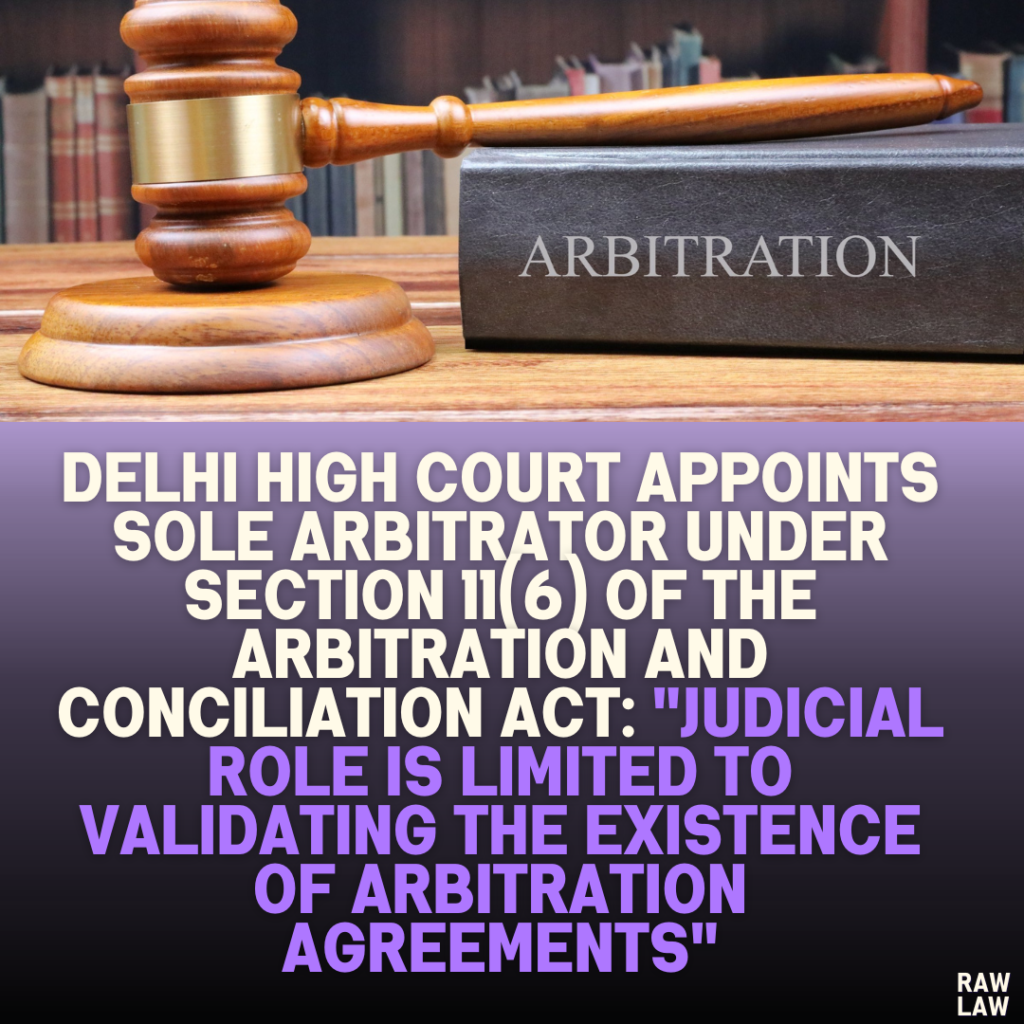Court’s Decision
The Delhi High Court resolved the petition filed under Section 11(6) of the Arbitration and Conciliation Act, 1996, by appointing a sole arbitrator to adjudicate the disputes between the parties. The court emphasized that its role in such petitions is limited to determining the existence of a valid arbitration agreement and that all other issues must be resolved by the arbitrator.
Facts
- Agreement and Role:
The petitioner had appointed the respondent as the General Manager-Plant Head under an employment agreement dated November 25, 2021. - Dispute Origin:
The respondent resigned on March 10, 2024, allegedly in breach of the terms of the agreement. The petitioner claimed damages of ₹10,54,076 for the breach and issued a legal notice on April 17, 2024. - Arbitration Clause:
Clause 23 of the employment agreement provided that disputes would be resolved through arbitration, with New Delhi as the seat and venue. It required amicable negotiations before arbitration and specified the appointment of a sole arbitrator to resolve disputes. - Failed Negotiation:
The petitioner issued a notice invoking arbitration on June 25, 2024, and proposed three names for the role of sole arbitrator. The respondent, in a reply dated September 24, 2024, refuted the claims and did not agree to the proposed names, leading to the present petition.
Issues
- Whether the disputes arising from the resignation and alleged breach of the employment agreement are arbitrable under the terms of the agreement.
- Whether the court has the jurisdiction to appoint a sole arbitrator under Section 11(6) of the Arbitration and Conciliation Act.
Petitioner’s Arguments
- The petitioner emphasized the enforceability of the arbitration clause, which covers disputes relating to the employment agreement, including resignation and alleged breaches.
- The petitioner contended that despite attempts at mutual agreement, no sole arbitrator was appointed, warranting the court’s intervention under Section 11(6).
Respondent’s Arguments
- The respondent acknowledged the existence of the arbitration agreement but denied the petitioner’s claims on their merits.
- The respondent did not object to the court’s jurisdiction to appoint an arbitrator and left the substantive issues for adjudication during arbitration proceedings.
Analysis of the Law
The court examined the following principles:
- Scope of Inquiry Under Section 11(6):
As laid down in SBI General Insurance Co. Ltd. v. Krish Spinning, 2024 SCC OnLine SC 1754, the court’s role is confined to determining the existence of a valid arbitration agreement. It does not involve examining the merits of the case or the arbitrability of specific claims. - Enforceability of Arbitration Clause:
The arbitration clause in the employment agreement explicitly provided that disputes arising out of or related to the agreement, including its termination, would be resolved through arbitration. - Jurisdiction of Arbitrator:
Any challenges to arbitrability or jurisdiction can be raised before the arbitrator, as permitted under the Arbitration and Conciliation Act, 1996.
Precedent Analysis
The court relied on the following precedent:
- SBI General Insurance Co. Ltd. v. Krish Spinning (2024 SCC OnLine SC 1754): The Supreme Court clarified that under Section 11(6), the only consideration is the existence of a valid arbitration agreement.
This precedent reinforced the principle that courts should not delve into the merits of the dispute or issues of arbitrability during the appointment process.
Court’s Reasoning
- Existence of Arbitration Agreement:
The court observed that Clause 23 of the employment agreement clearly outlined the procedure for arbitration. The respondent did not contest its validity or existence. - Limited Scope of Judicial Review:
The court emphasized its limited role in Section 11(6) petitions, reiterating that disputes regarding jurisdiction or substantive issues must be decided by the arbitrator. - Practical Resolution:
Given the lack of mutual agreement between the parties, the court exercised its jurisdiction to appoint a sole arbitrator to ensure timely resolution.
Conclusion
The court appointed Mr. Daksh Kadian as the sole arbitrator. It directed that:
- The arbitration proceedings would be conducted under the aegis of the Delhi International Arbitration Centre (DIAC).
- The arbitrator must provide the requisite disclosure under Section 12 of the Arbitration and Conciliation Act before proceeding.
- The respondent retained the right to raise objections regarding arbitrability or jurisdiction during the arbitration.




Pingback: Bombay High Court Regularizes Appointment of Assistant Teacher Despite Procedural Lapses by Management; Penalizes School ₹2.5 Lakh for Violating Transparency Norms in Recruitment Processes - Raw Law
Pingback: Supreme Court Restores Cheque Dishonour Complaint Under Section 138 NI Act: Criticizes High Court’s Premature Quashing and Holds Personal Knowledge of Power of Attorney Holder Adequately Established - Raw Law